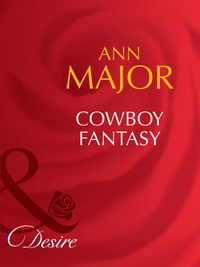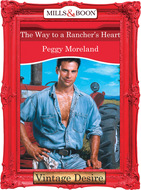Raamatut ei saa failina alla laadida, kuid seda saab lugeda meie rakenduses või veebis.
Loe raamatut: «Cowboy Fantasy»
Cowboy Fantasy
Ann Major

MILLS & BOON
Before you start reading, why not sign up?
Thank you for downloading this Mills & Boon book. If you want to hear about exclusive discounts, special offers and competitions, sign up to our email newsletter today!
Or simply visit
Mills & Boon emails are completely free to receive and you can unsubscribe at any time via the link in any email we send you.
ANN MAJOR lives in Texas with her husband of many years and is the mother of three grown children. She has a master’s degree from Texas A&M at Kingsville, Texas, and is a former English teacher. She is a founding board member of the Romance Writers of America and a frequent speaker at writers’ groups.
Ann loves to write; she considers her ability to do so a gift. Her hobbies include hiking in the mountains, sailing, ocean kayaking, traveling and playing the piano. But most of all she enjoys her family. Visit her Web site at www.annmajor.com.
Contents
Prologue
Chapter One
Chapter Two
Chapter Three
Chapter Four
Chapter Five
Chapter Six
Chapter Seven
Chapter Eight
Chapter Nine
Chapter Ten
Chapter Eleven
Chapter Twelve
Chapter Thirteen
Chapter Fourteen
Chapter Fifteen
Prologue
South Texas
The borderlands
Black feathers spun lazily above in a cloudless, azure sky.
Teo’s head hurt as he lay on the hard earth watching the big black birds. His stomach throbbed queasily.
He didn’t know where he was, only that he was somewhere north of the border, somewhere in Tejas. Somewhere on a huge ranch the coyote had called El Dorado.
Teofilo Perez was ten years old and he was dying.
“Mamacíta!”
Teofilo’s hands clawed sand. Then he remembered.
She’d sent him off to scavenge another part of el dompe with Chaco and his gang. Then she and Papacíto had run away.
When Teo had stayed up all night waiting for them, Chaco had laughed.
“They aren’t coming back. It happens all the time. Todo el tiempo.” Chaco had stared indifferently toward the north. “There are many orphans in el dompe. Left behind when their families disappear over the wire. My father…too.”
Now Chaco was gone as well.
Sweat stung Teo’s eyes like hot tears. Where was he?
Burrs and thorns bit into his back. Here there were snakes and spiders in the high grasses; wild animals, too. If Teo didn’t get up and go on, he’d die.
Then it would all be for nothing.
He was burning up, from the inside out; starving, too. He felt as thirsty for water as a bone-dry sponge. Then the coyotes started howling again, and he tasted the coppery flavor of his own panic.
He had to get up and catch Chaco. He had to keep walking north through the endless sandy pastures choked with mesquite and huisache that led to el norte.
To Houston. To Tiá Irma.
Chaco had warned him to stay out of the open, so La Migra couldn’t spot him from their helicopters.
Teo felt too weak to stand, so he lay on the hard, packed ground, his swollen, sunburned lids blinking, his eyes blurring every time he opened them. Through the screen of his dense lashes a too-bright sun spun above the stunted oak trees, shooting diamond-patterned pricks through the branches. The orange orb grew bigger and bigger until it exploded in a blinding brilliance that flooded the white-heat of that harsh, unforgiving sky.
His last meal had been breakfast two days ago—two boiled eggs and three tortillas that had been gritty and stale. His hands fisted again; he tried to swallow, but his tongue was too swollen and his throat too raw and gritty.
Fat black flies buzzed. Some mysterious creature grunted and snorted in the thicket. Teo shivered as he imagined the claws of a puma or the teeth of a coyote.
“Ayudame, Dios.”
He wanted to go home, not to Cartolandia, which was pocho for Cardboard Land, the barrio where they’d lived near el dompe in Nuevo Laredo. No, he wanted to go back home to his mountainous village, Tepóztlan. But there were no jobs there for Papacíto, no future for any of them. Nothing.
Nada, nada, mi hijo.
Papacíto had said those same words a week ago after government tractors and bulldozers had crushed their shack and bedraggled garden along with thousands of others and left them homeless again.
The next day, Papacíto had run away. Probably to look for work in el norte.
Teo couldn’t remember the last time he’d been in school or even his last bath. He felt like a slab of meat drying in the sun, a worn-out corpse.
Papacíto had promised him a house in el norte with a flush toilet, toys, a garden where he could play.
Swish. Black feathers were falling out of the sky, crash-landing clumsily, settling themselves in the branches of the thorny thicket.
Vultures.
Teo stared stupidly at the big black bird folding his wings. Another bird hopped out of a tree and scuttled closer.
Teo had to get up, but when he struggled to his knees, he reeled dizzily. Once he had crawled on bleeding knees to pray to the Virgin in Mexico City. That memory was followed by a sweeter one. He was home in the cool shade of his porch, lying on his hammock, and his mother and grandmother were singing him a lullaby. He began whispering his Hail Marys.
When he opened his eyes again, he was on the ground, and the buzzards were circling lazily against the pale blue. Through swirls of dust, a lone rider on a big black horse moved toward him. The tall man, whose low-crowned sombrero was the color of dust, wore a strange costume of weathered rawhide. He was as filthy as Teo, yet he sat on his horse with a world-weary cockiness that said he was somebody, more than border trash from el dompe.
Although the man’s coppery face was hard and lean, his teeth were as white as the chicles Teo had sold to the fat gringo turistas. He had a golden mustache.
Terrified, Teo grabbed at his plastic bag of tortillas that Chaco had tied to his belt. In his other hand he gripped the bottle that held the remains of Chaco’s red soft drink. Swaying weakly, drowning in the blinding sunlight, Teo struggled to his feet.
The man called down to him gently in his native tongue, more gently than Papacíto ever spoke. “Cuidado, manito.”
Was he a phantom? A trick, like the trick the coyote had played when he’d dumped Chaco and the other toughs from el dompe here, in the middle of nowhere, swearing that a truck would be waiting for them a little farther where the pasture hit the road past the immigration checkpoint.
The stranger’s manner and the fact that he spoke a lilting, peculiarly accented Spanish was more terrifying than anything.
Then he saw her.
The trees began to whirl, and Teo was on the ground again, his dirty white shirt covered in blood. Only it wasn’t blood. It was the sugary soft drink. He’d spilled the last of Chaco’s precious drink.
Chaco would beat him for sure. Sobbing, he begged God to tell Chaco he was sorry, to tell his mother he was sorry he hadn’t minded when she’d told him to sweep the street or bring her a bucket of water.
When the tall dusty rider got off his horse, Teo screamed and screamed.
Until he saw a girl running lightly beside the huge man. Her hair was straight and reddish gold, with deep shifting highlights glinting in the hot blaze of light that flowed all around her.
She was an angel.
His very own angel.
Teo closed his eyes, and a great peace stole over him. He wasn’t afraid to die anymore.
“Angelita!” he whispered.
He opened his eyes. The girl wasn’t an angel. It was his mother, and her voice was as sweet as those songs she used to sing before he went to sleep.
“Don’t be afraid. You are safe, little one.”
With the last of his strength, Teo stretched his thin hand toward her, but she vanished.
There was only the mysterious rider.
Only terror.
Only death in a strange, wild land.
One
South Texas
El Dorado Ranch
A bad woman can ruin the best man alive, same as a bad man can destroy a good woman.
El Dorado Ranch, set as it was right square in the borderlands cactus country of the biggest state in the continental union, might seem too rough a place for sob-sister tales to get a firm hold. But there’s nothing more fascinating than love gone wrong; nothing more fun to talk about, either—especially if it’s the boss’s love life gone wrong.
North Black, for all that his daddy had been a local legend, for all that North had inherited his own natural arrogance and aura of cowboy majesty, for all that he sat that high-steppin’, champion quarter horse, which had set him back a cool half million, for all that his carved leather saddle was trimmed in sterling, for all that he’d been billed by the state’s most popular magazine as the most eligible bachelor in Texas—for all that, this cowboy king was damned near done for.
Nothing is more disagreeable or more difficult to stop than gossip, especially when it’s true. It was common knowledge at El Dorado Ranch—better known, at least in these parts, as North Black’s private kingdom—that the king was on the verge of collapse. And not only because the worst drought in living memory plagued his vast ranch in south Texas. But because an impossible little spitfire had gotten a grip on his heart and then done him wrong.
North was killing himself with overwork, his loyal crew said, doing way more than his share of the real cowboying. Why, the king was up before dawn and working cattle long after dark. Even when his hands quit, he never took a break. His lunch was a sandwich in the saddle topped off with a swig out of his canteen. Evenings, when no serious rustling or poaching mischief was afoot, were spent in his office poring over ledgers or talking on the phone.
Wherever there was trouble—illegals, bulls loose, broken pipes, cut fences, dry water holes, cows lost, a horse that needed to be broken, or more of the Midnight Bandit’s mischief, North took the job on himself. Then there was Gran, who stole his best cowboys to work her garden every time he turned his back.
Nobody blamed North for wanting to work himself to death. Not after what that little witch, Melody Woods, had done to him—time and again.
First, she’d jilted him at the altar like he was a nobody—right there, in front of God, his crew, his friends, his family; hell, in front of the entire damned ranching aristocracy of Texas. She’d made a fool of him, the king, a man known to be too arrogant and too proud.
“She did worse than hurt his pride,” said Sissy, his wild sister, who was worrying about him more than usual. “She broke his heart.” And Sissy knew a thing or two about broken hearts.
“His father would never have lost it over a woman,” Libby Black, his grandmother asserted at every possible occasion. “The ranch came first.”
“You always make El Dorado sound like a religion, Gran,” Sissy said.
“It was till I got some sense and took up gardening.”
“It’s not a religion,” Sissy said. “Not for me.”
“Which is why I put North in charge.”
Not that North ever talked about the impossible Miss Woods. Not even after he’d fallen for her sister, Claire, on the rebound. Fortunately he and Claire had come to their senses, realizing they should be friends rather than lovers.
Gossip had it that Miss Melody Woods had had a hand in the breakup of that romance. That very same night, first chance she got, she’d gone and made a fool of him again.
Yes, sirree. She’d turned the king into a jealousy-crazed maniac in a run-down bar in Rockport, Texas. Hell, that shrimpers’ dive better known as Shorty’s, was so bad, the king would never have set the scuffed toe of his handmade, black boot inside it, if Melody hadn’t lured him there on purpose. For reasons known only to her, she’d danced and gotten those rough, dangerous fishermen in such a rowdy stir, they would’ve given her more than she’d bargained for, if the king hadn’t rushed her and carried her off over his shoulders like he was a caveman and she was his woman.
Only she wasn’t his woman or ever going to be—according to him. The hands knew that because the very next day a couple of greenhorns at El Dorado were stupid enough to make crude bets as to exactly what the king must’ve done to punish Miss Woods in bed later that night. When Lester Rivers got himself liquored up enough to ask the king, who was even taller and broader-shouldered than Lester, for details about their little romp, it had taken Jeff Gentry, his burly foreman and best friend, and W.T., the laziest cowboy on El Dorado, to hold North long enough for Lester to hightail it to Laredo.
Later, the king had thanked everybody, even W.T., for saving him from strangling Lester with his bare hands. Then North had said, very softly, very calmly, but in that voice, everybody in his kingdom, even Gran, understood.
“What happened that night is nobody’s business but mine! Nobody, none of you, is to ever even think about what Melody Woods does in or out of my bed or ever say her name at El Dorado Ranch again! As far as I’m concerned, she no longer exists. Understand? Comprende?”
Nobody had spoken of her, in Spanish or English—at least, not directly and not within the king’s earshot. But the forbidden holds a mighty powerful appeal. Especially for comrades in a cow camp lonely for female companionship, especially when that forbidden female is willowy and sexy and full of surprises as a brand-new kitten.
It was plain to see by the stubborn set of North’s strong, jutting jaw, he wasn’t over that night. Plain to see by his stern silences and his inability to even crack a smile at his men’s dirty banter, that the king hadn’t forgotten the young lady or that night any more than they had.
No, sirree. The king wasn’t through with Miss Melody Woods.
Any more than that little firecracker was through with him.
It was just a matter of time before that pair got into a tussle again.
What would that sexy little gal dream up for an encore?
His men’s yelps along with that damn cow’s stomping and grunting and snorting inside the jug at the far end of the huge barn would have set a sane man’s nerves on edge. North was hardly sane.
He hadn’t been himself since that night when Melody had danced for the world and then refused to dance with him in private. To make matters worse, Dee Dee Woods, Melody’s socially ambitious mom, had him on the phone and was unraveling the fraying ends of his frazzled psyche with her shrill demands.
“I said supper!”
He held the phone away from his ear. How could such a pretty woman have such a grating voice? “Tonight? Your house? I don’t think that’s a good—”
“But Melody’s safe and sound in Austin.”
He knew better than to argue.
“Sam and I miss you. That’s why when your accountant said you were coming to town, I decided to call.”
He missed them, too. “Just a second, Dee Dee. We’ve got a cow in labor, and Jeff’s yelling so loud—”
On a shudder, North pressed the cordless telephone tighter against his ear and bolted himself inside the stall with his pet llamas. Camels, he called them when he was feeling affectionate or worried, which was all the time, ever since Little Camel had been born so puny.
Not that it was any quieter inside their stall. Not with that distressed cow in labor, bawling and fit to be tied again.
“What was that you said, Dee Dee?” North demanded.
He liked Dee Dee Woods even if she’d set her sights on him as a future son-in-law for all the wrong reasons.
“I heard you’d be in town,” Dee Dee shrieked. “So, I called to invite you to supper.”
The cow started kicking so loud North could barely hear her.
“It’ll just be Sam and me…I promise!”
“All right.”
“Seven-thirty sharp.”
He said bye and hung up.
“Boys,” he shouted. “I was on the phone. Y’all were hollering so loud, I couldn’t hear myself think. I just did a very stupid thing.”
“W.T. let go, and she kicked me—two hooves, square in the chest!” Jeff yelled back at him. “Get down here, King!”
North was so mad he stayed put.
Damn it. It was Jeff’s fault he’d said yes to Dee Dee Woods. Gentry deserved to sweat. Hell, droplets of the stuff were trickling from North’s wet black hair, soaking his denim shirt and blue surgical overalls as he considered sitting down to dinner in the Woodses’ house again.
He’d said yes.
Not to worry. You have a date with Maria on Saturday. You’re through with Melody.
Just talking to her mother had brought everything back, especially that night.
North stood alone in a stall, occupied not by a cow or horse, but by that unlikely pair of camels and wondered if he should call Dee Dee back and send his regrets.
He began to frown in earnest as he stroked the mama llama. Then he eyed her gangly newborn more worriedly. The mother was dark brown with black patches on her face and rump. Her milk wouldn’t come, and the baby—an impossibly skinny runt who was all ribs and neck and match-stick legs—couldn’t suckle.
For some foolish reason, even after nights spent chasing the Midnight Bandit, North had been getting to the barn at 4:00 a.m. to play nursemaid to the shy baby llama, warming bottles, cradling him, feeding him. Even so, Little Camel wasn’t putting on weight.
Jeff yelled, “Time to play vet, King.”
“See you later, Little Camel,” North whispered with more affection than he wanted to feel.
The shy, scared baby reminded him of…
He saw a little girl on the ground, her skirts hiked, her skinny knees torn and bloody; worse, her smoky-blue eyes dark with fear. Abruptly the king stopped that memory.
His defiant boot heels echoing all the way to the rafters, North stalked across the concrete floor of his barn toward the scuffle of his men and the cow in that distant stall.
It was late August and 113 degrees in the shade outside if it was a degree. Inside the barn felt like a sauna. He could almost feel the beige dust that coated his wavy hair and dark skin turn to mud and ooze under his collar.
North was exhausted, on edge, but he forced himself to concentrate on the job ahead instead of on…on Melody.
Damn her hide…or rather her silky, golden skin. And she was soft—he’d never forget how good she’d felt the first time he’d accidentally touched her and she’d jumped as if she’d been shot. Not that every nerve in his body hadn’t popped like sparklers, too.
Why the hell had Dee Dee called? He didn’t want Melody on his mind. For months he’d refused to think about her.
He didn’t still want her, still dream about her. He didn’t. Not after what she’d done. Not after what she hadn’t done.
But if some idiotic part of him still did want her, that was the part he was trying damned hard to kill by working himself so hard. His misplaced affection for the wrong woman had jeopardized not only his pride and his heart, but also his family and their ranch.
He had a position to uphold. When he married, if he married after what she’d put him through, it would be to a mature, sensible woman who understood ranching, who could contribute something of value to El Dorado, who would lend sanity to his hard life instead of chaos, who could make commitments and stick to them. He wanted a harmonious marriage to a woman, who could show a man she loved him in a warm womanly way, to a woman like Maria Langly, who had been born and bred to ranch life, just as he had.
North was fighting for his ranch, his legacy and his world. His back was against the wall. He had no time to waste on a woman who’d never known for sure whether she wanted him, a woman who would never be anything but trouble.
Unbidden came the vision of a long, cool slip of a girl in skintight jeans and a halter top. Melody did have the cutest and most mischievous smile and the softest honeyred, straight hair. She smelled good, too. And, boy, when that little exhibitionist hadn’t been driving him crazy, or turning him on, she sure had made him laugh. Nobody had ever been able to make him forget, at least for a little while, the ranch and the heavy responsibilities he’d assumed too young.
She was cute. Trouble was, she knew it. She’d reveled in making him forget that he was supposed to be stern and tough, that as the largest landowner in south Texas, he was supposed to set an example for his men, for the whole damn ranching community in these parts.
Hell, his granddaddy had taken him up on his saddle when he was five. They’d worked cattle together, and all the while the old man had been whispering that when he was a man, all this—meaning the cattle, the vast acreage—would be his responsibility. His father, Rand Black, had been a legend. North was determined to carry on his daddy’s legacy and support the people whose families had lived here for generations, who depended on him for their very livelihoods.
Melody never bowed down and worshiped him like everybody else around here. So, why the hell had he loved this defiant brat since she’d been a young girl? She wasn’t even any good in bed. She was too uptight and skittish to be sexy in private. At least with him. No, she preferred public displays of wanton affection that drove him and every other guy who caught her performance wild. Always, she left him hot and hard and frustrated, and jealous as all get out. When they were alone, and he made a move, she got as scared and shy as his baby camel. He loathed everybody thinking she was hot and easy when that’s the last thing she was.
Except for that last night.
You’re not supposed to think about her or what happened, ever again. You’re supposed to work—till you forget her.
So, how come you accepted a dinner invitation tonight in Corpus Christi from her mother?
Because Dee Dee swore Melody’s in Austin and you won’t see her. Or talk about her. Because it was so hot and loud in the barn you hadn’t been able to think.
Liar.
You want to see Dee Dee’s most recent pictures of her on the fridge. You want Dee Dee to drop those annoying little hints…
Forget her!
North was trying. He’d all but imprisoned himself on his ranch. He had 800,000 acres of baking shin oak and prickly pear and thousands of head of cattle to protect him from that clueless she-devil, who had a lot of growing up to do up in Austin.
North could hear his stressed cattle outside squalling as his men cut them from the herd and drove them into pens and chutes, some to be kept and fed, some to be vaccinated and tagged, some to be loaded onto the cattle trucks that were discreetly hidden in mesquite thickets.
Tough times made for brutal decisions.
No matter how much land or money a rancher had, he was powerless against the weather and the hard realities of market prices. Due to the drought, he’d run out of grass. The beef market was flooded. The cost of feed was too high to keep the herd. Then last night the Midnight Bandit had cut his fence and tried to rustle a truckload of cows again.
Outside the barn, horses neighed and sputtered. The cattle roared, and his men shouted. These were the familiar, beloved sounds of home to North. And of doom.
For more than a hundred years this ranch had been owned and run by Blacks. The pictures of his ancestors hung inside the ranch house, their grim expressions setting standards and demanding impossibilities of him in these modern times.
Inside the stall now, North was still sweating profusely as he picked up a scalpel, still in its wrapper. He picked up the irritated, very pregnant cow’s tail, then let it drop. She didn’t react.
“Looks like the spinal’s okay, King,” Jeff said behind him.
“Good.”
Jeff was wide as a beam and nearly as tall as North; he was red-haired, bowlegged, narrow-eyed, and bullheaded. But a lady’s man nonetheless. His daddy had been the ranch foreman before him, and his daddy before him. Jeff had grown up on the ranch just like North had. They were closer than most brothers. El Dorado was that kind of place.
“So, let’s get to work—fast,” Jeff urged.
North inspected the shaved area and the black lines Jeff had drawn along the reddish brown hide. When he was satisfied, he injected a topical anesthetic along every inch of the line. After he sliced through the hide with the scalpel, Jeff injected more anesthetic inside the incision. North began to cut deeper.
There were a lot of bleeders, but North deftly stopped them. Within a minute he was popping hooves out of the cow’s belly and Jeff was pulling the rest of the calf free. They worked together, in harmony, as they always did, smiling at each other after it was over because it was a helluva rush to look into those wet brown eyes and witness the beginning of a new life.
Another life saved.
But for what? North wondered silently as he knew Jeff did. If it didn’t rain? For an early death in a slaughter-house…his short life bartered for a few peanuts? Worse, he might get himself rustled and hauled south to Mexico.
Again, North thought of Melody who’d become a vegetarian just to spite him after her first and only visit to the ranch.
North frowned as he dropped antibiotics into the uterus and then began to sew up the cow, barking questions at Jeff to distract himself from Melody. “Calf breathing okay?”
North remembered Melody saying after he’d finished a long day at the squeeze chute, “I won’t ever eat a hamburger again. I keep seeing a cute little brown-eyed calf peeping its head out of my hamburger bun and pleading for help.”
He stared at the cute new calf. It galled him that Melody thought he didn’t care about his animals.
“He’s a cute little cuss, ain’t he, King?”
Forget Melody Woods.
“Get him tagged and shot!”
Within minutes, North was done and striding out of the barn in shotgun chaps made of scarred leather. He made his way toward the cloud of dust that muted the harsh sun somewhere up above in that bluish white sky.
He pulled his bandanna up and took Mr. Jim’s reins. As he rode toward the herd, Jeff and the other cowboys seemed to float in a golden haze of dust.
When North got closer, Mr. Jim shook his long red mane and neighed. His vaqueros nodded in deference, and Mr. Jim reared.
“Easy, champ,” North whispered to Mr. Jim.
He flicked the reins and began shouting orders to his men in fluent Spanish right before he galloped into the herd. Then, and only then, as he cut cattle alongside his day-labor cowboys, was he able to forget the impossible Melody Woods.
Because he had to drive in to Corpus Christi, he quit earlier than he had in weeks. Before going to the house, he returned to the barn.
The calf he’d delivered was doing fine, so he made a final stop at that stall occupied by the mama llama and her pitifully skinny baby.
“Jeff,” he shouted.
Jeff came running. Hell, everybody came running when the king yelled.
Everybody except…her.
When the baby llama forgot his shyness for the first time and moved toward him trustingly on shaky legs, North melted. He remembered a skinny little girl on the ground, drying her tears with the back of her hand before throwing herself into his arms.
“How long since my baby camel here ate?” North demanded in an oddly rough voice.
“Three hours. Want me to feed her again?”
“Him. No,” North said, surprising himself as he strode toward the refrigerator and grabbed a bottle of fresh milk. “Warm this. I’ll do it.”
“You’re wasting a lot of time on that runt,” Jeff said as North squatted near the fragile newborn.
“I guess I’m a sucker for lost causes.”
Melody had said he had no heart.
The barn phone began to ring as North cradled the llama across his knees and offered him the bottle. As the camel nibbled tentatively, W.T. banged inside the stall with the cordless. The llama shivered and stopped suckling. If anybody had the look of a dimestore cowboy, it was W.T. Scuffed high-heeled boots, wide hat, the shiftless fraud carried himself with more style than anybody on El Dorado.
“Take it easy when you come in here,” North whispered testily.
“Border Patrol. Delfino’s at the gate in his Dodge Ram-charger demandin’ access—”
North grabbed the phone. “Delfino, you’d better be here to tell me you’ve got a lead on the Midnight Bandit. He damn near made off with a truck—”
“No. Some half-starved illegals. Kids. Not ten miles south of your headquarters. From our helicopter. Brush too dense to land.”
“Damn,” North muttered.
Tough as it was in Texas, it was tougher in Mexico. And getting tougher. Ejidos, small Mexican settlements, sprang up along the southern edge of El Dorado almost weekly. The people who lived in them were unemployed. They didn’t have a damned thing to do but watch the goings-on at El Dorado.
North had started wearing his Colt when he worked remote pastures of his ranch. He never knew anymore who or what he might run into on his own land. Anytime he spotted illegals, he called the Border Patrol.
Melody’s voice piped up in his mind. “Americans spend more than four billion dollars a year on pet food. You know what else, Bertie? We don’t spend a fourth of that on food to feed starving people in third world countries.”
Bertie. That was Melody’s special name for the king. If ever there was a sissy nickname—
More and more, intense, desperate men seemed to be making border crossings. Not just men these days. Women and children, who were pitifully unprepared to attack the desert.
Delfino repeated that single word, “Kids.”
Ten miles. Illegals never carried much food or more than a gallon of water. In this heat, on foot, they’d be dead before they reached his headquarters.
Tasuta katkend on lõppenud.








